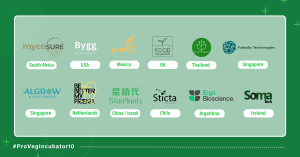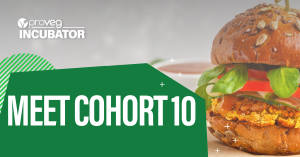We were looking for the most impactful food tech and biotech as well as ingredients solutions to speed up the transformation of our unsustainable food system. Here’s who we found.
The 12 startups joining Cohort 10
- Be Better My Friend (Netherlands, 2021): Founders Marikevan Beurden and Joost Lindeman have developed plant-based butter and cream alternatives for professional pastry chefs. Find out more at bebettermyfriend.com
- FoodSquared (UK, 2021): Founders Frankie Fox, Wesley Yland, and Abi Aspen Glencross are using a ‘patent pending’ process and proprietary ingredient formulations to create next-generation plant-based shellfish, starting with plant-based shrimp. Find out more at foodsquared.earth
- Ergo Bioscience (Argentina/US, 2020): Founders Alejandro Barbarini, Maria Laura Garcia, and Eduardo Peña develop complex animal proteins by plant cell precision fermentation. Find out more at ergofoods.com
- Plant Origin (Thailand, 2022): Founders Pasakorn Niratbhand, Patarachet Soodsaguan, Panu Srisawasdi, and Akkasit Jongjareonrak are developing plant-based protein alternatives using hydrolyzed rice bran protein, which is extracted from byproducts of rice production. Find out more at plantorigin.co
- Fattastic Technologies (Singapore, 2022): Founder Satnam Singh is developing a plant-based fat alternative that improves the sensory properties of alternative protein products with its innovative ‘oil structuring technology’. Find out more at fattastic.tech
- Propel Foods (Mexico, 2022): Founders Joel González Gómez and Jayat Elena González Palomeras are using artificial intelligence to produce frozen, ready-to-eat, plant-based meals including tacos, burgers and chorizos with a strong emphasis on health and nutrition. Find out more at propelfoods.com
- Algrow Biosciences (Singapore, 2022): Founders Sudhir Kumar Pasupuleti and Sukhi Wei create sustainable and nutritious protein using microalgae. Their clean-label process for removing chlorophyll results in a taste- and colour-neutral protein-rich biomass with a complete amino acid profile, packed with omega-3, iron, and potassium, that can be produced at a cost that is 85% compared to its competitors. Find out more at algrowbiosciences.co
- MycoSure (South Africa, 2021): Founders Charles Reed, Greg Brown and James McLaren are developing mycelium-based fermentation technology to provide nutraceutical ingredients in a scalable and cost-effective way. Their B2B platform strategy is to supply branded ingredients to the food and beverage sector. Find out more at mycosure.co.za
- StarPlants (China/Israel, 2021): Founders Eran Dubovi and Udi Baran run a plant-based food company specialising in chick pea milk and snacks. The company, which is based in China and led by owners based in Israel, develops, manufactures, and sells the products. Find out more at starplants.com.cn
- SomaTech (Ireland, 2023): Founders Dr Tony Martin Callaghan and Dr Alejandra Omarini have developed a scalable solid state fermentation platform that uses fungal mycelium to upcycle locally produced side streams, creating affordable, functional protein-rich food ingredients. (No website currently).
- Sticta Biologicals (Chile, 2021): Founders Eduardo Agosin and Andres Ariztia have developed a proprietary microbial platform that uses precision fermentation to produce proteins and natural biochemicals for the food, agriculture and wellbeing sectors. The company’s SmartSerumTM, all-in–one, customised serum-free culture media includes proteins and ingredients for the mass production of cultivated meats. Find out more at sticta.com
- Bygg Foods (US, 2022): Founder Smári Ásmundsson is developing a product line including plant-based milk and vegan protein powder, created from upcycled ingredients. Bygg aims to cater to millennials and Gen Z consumers who prioritise health and environmental consciousness. The company aims to expand to a range of plant-based food and beverage categories. Find out more at byggfoods.com
Cohort 10 in Numbers
- 12 startups under 3 years old
- 4 startups from the Asia-Pacific region
- 4 startups from North and Latin America
- 3 startups from Europe
- 1 startup from Africa
- 7 are ingredients companies
- 5 are consumer products companies
- 5 are precision and biomass fermentation companies
- Applicants came from 42 countries around the world. Startups in Asia and Europe led the charge, with 29% based in Asia, 29% in Europe, 21% in North America (including Mexico), 12% in South America, 4% in Africa, and 3% in the Australian continent.
Trends we’re seeing:
- Next-gen nutrition. The ultra-processed argument against many plant-based products is a hot topic. By applying AI, upcycling side streams of the food industry and leveraging new ingredients, the startups in our cohort aim to provide clean label, nutritious, healthy and less-processed solutions, as this is top of the list for consumers, food producers, retail and food service.
- The rise of Asia Pacific. We’re increasingly speaking to startups in this region, echoing the recent findings by the Good Food Institute APAC that investments into alternative protein companies in Asia Pacific rose by 43% from 2021 to 2022 in all three pillars of alternative proteins: plant-based, fermentation, and cultivated.
Precision and biomass fermentation (mycelium). The trend to leverage different fermentation approaches continues to be strong. We’re seeing more startups developing products and enabling tech in these areas. The offerings are promising in terms of impact, potential scale-up and sustainability. - Precision fermentation platforms as enablers. This is an exciting area and we’re seeing more startups exploring it for creating cultivated meat mediums, and plant cell cultivation as a new way to express complex animal proteins like caseins and myoglobin.
- Innovative plant-based solutions to replace conventional ingredients. We’re seeing new and promising alternatives coming through, combined with B2B models, including butter, egg, milk and seafood, both for food producers and food service.
- Tough investment landscape. Startups are finding it harder to find lead investors and close rounds, while rounds and due diligence are taking longer. Many investors are less active and are focusing on portfolio support.
Find out more about the 12 startups in our brochure



